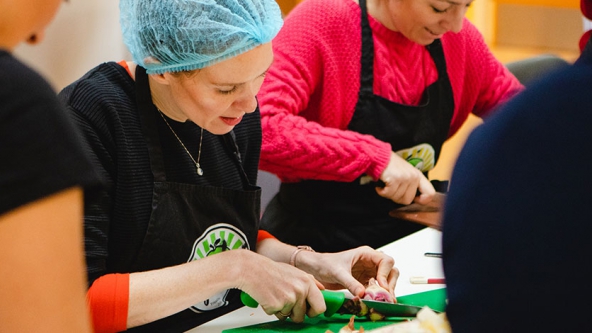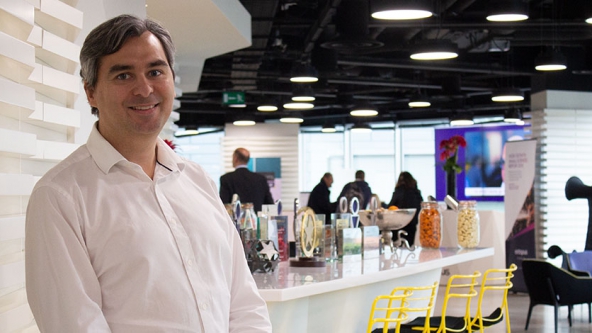Kat Shenton is the Head of Octopus Renewables Fund Management. She talked to us about how her early experiences shaped her career, how ethical investing has gone mainstream, and what she enjoys most (and least) about her job.
What does your role at Octopus involve? What do you do in a typical day?
I manage the money invested in renewables across all Octopus funds. Right now, we have over £3 billion in assets under management.
My first priority is making sure we’re doing a great job for our existing customers. We need to ensure their assets are well managed. We keep them updated via regular reports and meetings, as well as quickly and confidently answer any questions they have.
On top of that, I work with new clients. If, say, a pension fund is thinking of investing with us, we’ll take them through all aspects of how we will take care of their money. I really enjoy sitting down with people and explaining how we operate. Which is good, because I have to do it quite a lot!.
I also sit on our investment committee and help make decisions about which assets, such as wind or solar farms, we should buy (and sell). Renewables and ethical investing have become far more crowded markets in recent years, meaning we have to work hard to give our investors good returns.
How did your career lead you to Octopus? What did you do before you joined?
I started my career on IBM’s graduate scheme. That was lucky, because they were early leaders in corporate social responsibility (CSR). The experience really taught me that there’s scope to do good in the corporate world.
I left IBM to travel. Specifically, I went to Central America, and ended up teaching English at a Mayan school. The threat of environmental damage was having a real impact on the community I lived in. Seeing this in action has motivated me ever since.
When I returned to the UK, I worked in charities. Charity work was very close to my heart. But I also found it frustrating, because a lack of resources often meant things moved very slowly. That’s probably why my next stop was a solar startup called Solarcentury, which manages solar installations. We started out in a shed; I think I was employee number 10. By the time I left, I had helped them raise three rounds of capital and the team had grown to around 200 people.
How has your work changed over the years?
When I first started out, the idea of ethical investment was fairly ‘out there’. A lot of people turned their noses up at the prospect. Now, it’s mainstream, which is not surprising when you think about it. Someone like a pension fund manager is operating on a timescale of 30 or 40 years. If you’re in that role, you’re failing your clients if you don’t think about climate change, which is going to affect their money in a big way over that time period.
This change is being driven by the public, too. Fund managers and investors want to behave ethically because their clients are becoming more and more willing to vote with their wallets. They need to get on the right side of public opinion.
I’m happy to say we’ve been championing ethical investing for a long time, but the recent push has led to some practical changes. We need to do a lot more reporting now, because our customers want to know more about the good their investments are doing. And because the market is much ‘hotter’, it’s tougher to find good returns. But overall, it is of course a hugely positive thing.
What do you enjoy most about your job?
I love the thoughtful, long-term approach we tend to take. Shortly after I joined, the UK government announced a dramatic cut to solar tariffs, an incentive which had encouraged renewable investment. This scared most of our competitors out of the industry. Conversely, we were bold and decided to stick it out. It ended up being a great decision. It helped us grab market share and become the largest solar investor in the UK.
We really do have a positive impact on the planet too, given the type of investments we’re making. And I think we’ve changed the investment landscape in the UK a lot. That’s obviously gratifying when you care about these issues as much as I do.
Another thing I love about Octopus is the culture. People here are smart, curious, and driven. It’s a fantastic atmosphere if you want to push yourself to be the best you can be.
What’s the toughest part of your job?
A fast-paced environment cuts both ways. Sometimes, it can be hard to take a breath. People can have very high expectations in terms of how much you can get done in a day.
Something that can be frustrating about working in investments is that you often don’t get credit for avoiding problems and pitfalls. A large part of my job is about managing risk, which is vital for a sound investment strategy. But it doesn’t tend to get celebrated quite as much as a big win.
What’s the best piece of advice you’ve had in your career?
Very early on in my career, someone told me that when you make a mistake, you should fess up immediately. If you do that, it goes away, and you can move on. It sounds simple, but this advice had a big effect on me. I’ve always tried to be open and honest with people throughout my career.
At Octopus, we use the SDI® process to help team members learn more about their motivations, which can help us understand how we and our colleagues like to work.
Below, Kat tells us more about her SDI® colour and her motivations. Find out more about your motivations and read extra tips from Octopus leaders in our recent SDI® article.
The colours are blue (people-oriented), red (decision-oriented) and green (data-oriented). I’m a ‘hub’, meaning I’m somewhere in the middle and motivated by flexibility. But I lean much more towards red and blue than green.
Is this colour what you expected? And has knowing this helped you in your work?
Yes, it definitely feels accurate. Knowing it hasn’t really changed how I see myself, but finding out other people’s colours has been massively useful. ‘Reds’ can upset ‘greens’ by skipping over the detail, for example. It made me more thoughtful about the way I approach those I work with.


